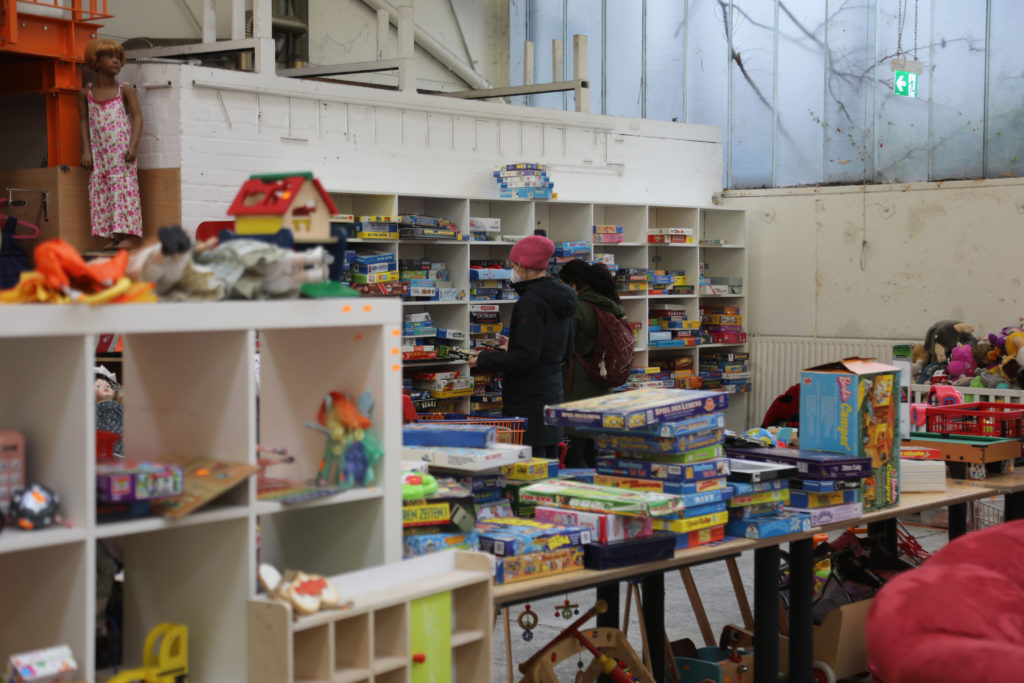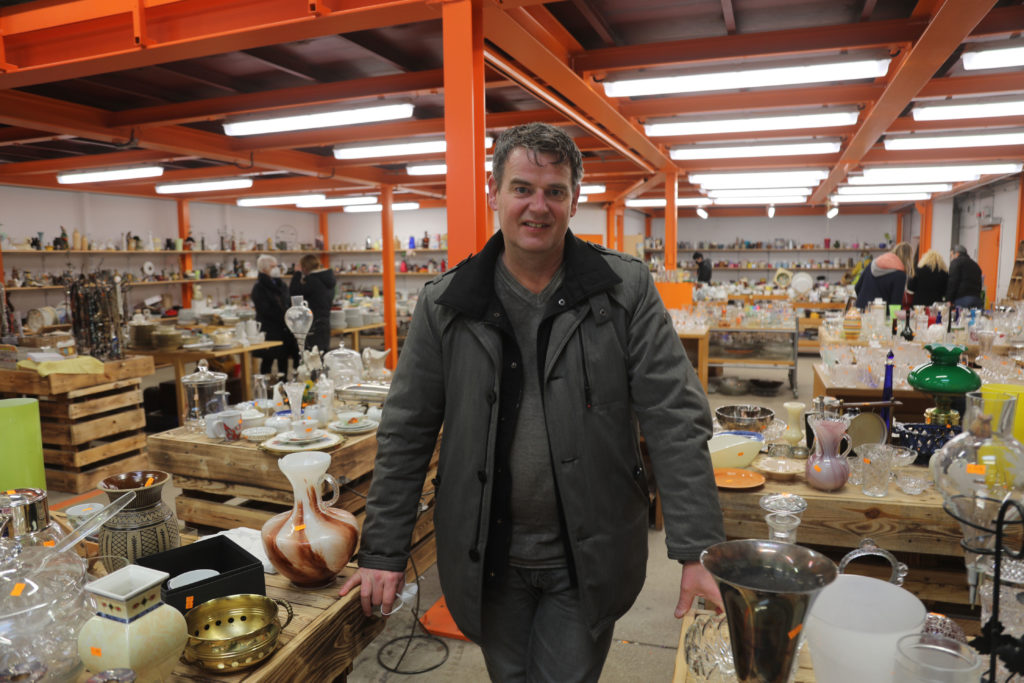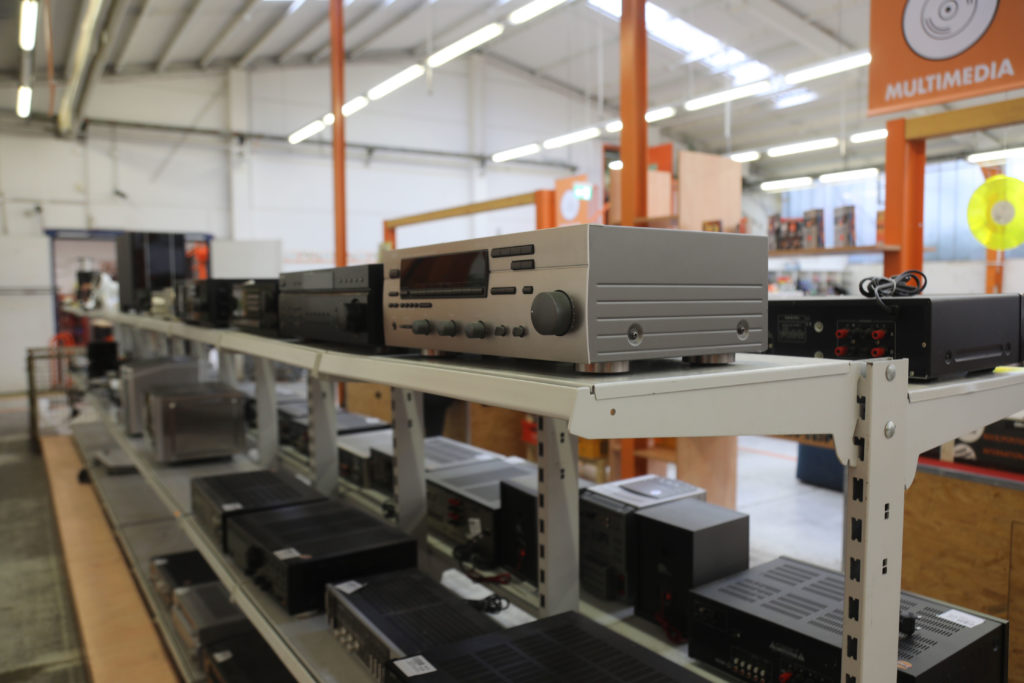Volcanoes are erupting in The Philippines, but on-fire Australia received some welcome rain. The Iran war cries have been called off and The Donald’s military powers are about to be hamstrung by the Senate. Meanwhile, his impeachment trial is starting, and we’re all on Twitter for a front-row seat.
Stilbruch: Hamburg’s city-run department store for recycled goods
With momentum from the repair and reuse movement at its back, this "IKEA for waste" is pushing back against throwaway culture.

Every day, several large trucks full of used goods arrive at a warehouse in the eastern suburbs of Hamburg, Germany’s second largest city, before being sorted through and categorized by a team of workers.
But this is not a normal waste processing facility. Stilbruch is run by the city’s sanitation department, and instead of destroying or disposing of these throwaways, the municipal team checks and, if necessary, repairs them, before putting them on sale to the public. It touts itself as “for everyone who prefers used to new—used is the new sexy.”
The cavernous, 20,000-square-foot space is like an IKEA for secondhand goods, every bit as wide-ranging as a large department store. Glass lamps, dishwashers, and vacuum cleaners fill one corner; antique artisan crockery and chic kitchenware take up another; and an entire section is dedicated to all sorts of electronics, including smartphones, laptops, and televisions. There’s even a decent selection of bicycles and watercolor paintings in stock. Some 400,000 objects are processed every year.
Stilbruch, which launched in 2001 as an initiative from the sanitation department’s head of sales, Jens Ohde, is pushing back against mindless consumerism by showing that products can be easily repaired and reused instead of sent to landfills. “These things are useful. They really aren’t rubbish,” says Roman Hottgenroth, operations manager at Stilbruch. “We are trying to stop throwaway culture and wastefulness. There’s so much value in what we treat like trash.”
Around 15% of Stilbruch’s goods come directly from households, 45% are sourced from municipal waste centers, and 40% are direct donations from the public, which often is the best quality. Most goods don’t require repairs, but all are checked over. Carpenters make sure furniture is in good shape, for example, and electricians have a robust procedure that means all electronics purchased from Stilbruch come with a one-year warranty.
When Stilbruch opened two decades ago, it had just a single permanent employee and six temporary workers from a municipal scheme to provide basic, part-time work to jobseekers. Hottgenroth, who joined in 2004, was at first also one of those jobseekers. But he gradually made his way up the ladder and by 2010 had reached his current role as manager.
Now Stilbruch employs 70 staff across two sites in Hamburg, with a revenue of €3.5 million in 2019 and an average annual profit of between €300,000 and €500,000. While the pandemic dented those figures, Hottgenroth expects takings to rebound once normality resumes. “More and more young people are coming to Stilbruch,” he says. “They know what will happen if we don’t stop the climate crisis.”

Among the growing number of customers rummaging through the shelves at Stilbruch is André, a 44-year-old working in the film industry who preferred not to share his surname. “I think it’s a really nice concept,” he says. “For me, the environmental side is really important. But it’s also good for people who don’t have much money.”
On his second visit to Stilbruch after coming for the first time two months ago, André is in search of decoration for his girlfriend’s new apartment—he has already picked up some ceramics and wooden chairs for the balcony. “I like used things, to give them a second life,” he adds. “New things aren’t always good quality, either. Often older things were made better.”
Experts have praised Stilbruch as a pioneering model that should be replicated in cities around the world. “Of course it’s something other cities should develop,” says André Rückert, a research associate at Dresden’s Institute of Waste Management and Circular Economy. “The benefits are clear: energy savings and emissions savings—not only at the production phase but also through the total life cycle of these goods.”
Stilbruch is part of a wider European movement against a waste-based economy and for the restoration of something companies have taken away: the right to repair. According to a study by the European Commission, 77% of European Union (EU) citizens would rather repair their devices than replace them. In March, the EU introduced requirements for manufacturers to guarantee that spare parts are available for refrigerators, washers, hair-dryers, and televisions for up to 10 years under its Ecodesign Directive, and there are plans to extend these rules to electronics, like phones and computers.
More than ten million tons of electronic waste is produced every year in Europe, making it the continent’s fastest growing waste stream. According to the Global E-waste Monitor 2020, Europe produces 16.2 kilograms of e-waste per capita, and global e-waste is set to reach 74.7 million tons by 2030. Repairing products and extending their usable lifespan is seen as key in mitigating and reducing environmental damage. “The right to repair is a really important part of this,” says Rückert.

Aptly, Stilbruch’s idea is already being reused. Rückert points to the examples of Berlin’s NochMall, which launched last year and will eventually be replicated in every one of the city’s 12 boroughs, and Halle 2 in Munich, which stocks products collected at the city’s 12 recycling centers. But Rückert says that while the model clearly works in large cities—Hamburg has 1.8 million inhabitants and therefore produces lots of waste—smaller cities and towns could adapt their own versions.
“They don’t have to have a big permanent warehouse,” he says. “It could be like a flea market that happens every half year.” (The town of Büdelsdorf, in northern Germany, for example, holds a secondhand market most days of the week).
Yet there’s plenty of room for improvement. Currently, Rückert says, many German municipalities only focus on processing, rather than reusing, waste. One useful scheme in Hamburg allows residents to call a number and have their “bulky waste” such as furniture picked up for free. “We need to make sure that reusable waste can be collected in a way that doesn’t damage it,” he says.
But momentum for a more sustainable, circular economy means that it is easier than ever to get backing for schemes like Stilbruch. “It’s on the political agenda,” adds Rückert. “Municipalities have written in their manifestos that they want to be sustainable, so they are supporting these initiatives.”
Riding on that wave of support for repair and reuse, Stilbruch plans to open a third warehouse in the coming years. And it’s always coming up with new ideas: working with the transport department, Stilbruch has supplied more than two million books to stock mini public libraries on 130 of the city’s buses. “I still get excited about the possibilities of what we can achieve every day,” says Hottgenroth.



[…] What makes the Stilbruch store in Hamburg, Germany different from a regular thrift store is that it’s run by the city sanitation department, and it’s big- as in 20,000-square-feet of space. Of the secondhand goods sold there, 45% are sourced from municipal waste centers and 40% are direct donations from the public. Here’s more from The Progress Network. […]
Great story! In America, we call them thrift stores, and they are very popular. Many of us love ‘cruising the thrift shops’!
[…] Hottgenroth, Operations Manager at Stilbruch, told The Progress Network “These things are useful. They really aren’t […]
[…] Hottgenroth, Operations Manager at Stilbruch, told The Progress Network “These things are useful. They really aren’t […]
[…] Hottgenroth, Operations Manager at Stilbruch, told The Progress Network “These things are useful. They really aren’t […]
[…] A city in Germany has started saving tons of goods from the landfills! Stilbruch is called the “IKEA of used goods,” and every day items are dropped off from donations or from trash collectors on their routes. These items get cleaned up, repaired, and re-sold to support a more circular economy in the country’s second-largest city. They went from having 1 full-time employee to 70! “Used is the new sexy… We are trying to stop throwaway culture and wastefulness. There’s so much value in what we treat like trash.” Read more: https://theprogressnetwork.org/stilbruch/ […]
[…] A city in Germany has started diverting goods from landfills, fixing them up and re-selling them! Stilbruch is the “IKEA of used goods,” and every day, collections from private individuals—or from trash collectors on their routes—brings goods which will all get cleaned up, repaired, and re-sold to support a more circular economy in the country’s second-largest city. They went from having 1 full-time employee to 70! “Used is the new sexy… We are trying to stop throwaway culture and wastefulness. There’s so much value in what we treat like trash.” Read more: https://theprogressnetwork.org/stilbruch/ […]
[…] useful. They really aren’t rubbish,” Roman Hottgenroth, operations manager at Stilbruch, told The Progress Network. “Used is the new sexy… We are trying to stop throwaway culture and wastefulness. There’s so […]
[…] useful. They really aren’t rubbish,” Roman Hottgenroth, operations manager at Stilbruch, told The Progress Network. “Used is the new sexy… We are trying to stop throwaway culture and wastefulness. There’s so […]
[…] useful. They really aren’t rubbish,” Roman Hottgenroth, operations manager at Stilbruch, told The Progress Network. “Used is the new sexy… We are trying to stop throwaway culture and wastefulness. There’s so […]
[…] useful. They really aren’t rubbish,” Roman Hottgenroth, operations manager at Stilbruch, told The Progress Network. “Used is the new sexy… We are trying to stop throwaway culture and wastefulness. There’s so […]
[…] realmente não são lixo”, disse Roman Hottgenroth, gerente de operações da Stilbruch, à The Progress Network . “Usado é o novo sexy… Estamos tentando acabar com a cultura descartável e o […]
[…] useful. They really aren’t rubbish,” Roman Hottgenroth, operations manager at Stilbruch, told The Progress Network. “Used is the new sexy… We are trying to stop throwaway culture and wastefulness. There’s so […]
[…] sind nützlich. Sie sind wirklich kein Müll“, sagt Roman Hotgenroth, COO von Stilbruch. Fortschrittsnetzwerk. „Der Benutzer ist der neue heißere … Wir versuchen, die Abfall- und Abfallkultur zu […]
[…] useful. They really aren’t rubbish,” Roman Hottgenroth, operations manager at Stilbruch, told The Progress Network. “Used is the new sexy… We are trying to stop throwaway culture and wastefulness. There’s so […]
[…] 「これらは便利です。 彼らは本当にゴミではありません」とStilbruchの運用マネージャーであるRomanHottgenrothは語った。 プログレスネットワーク。 「使用されているのは新しいセクシーです…私たちは使い捨ての文化と無駄を止めようとしています。 私たちがゴミのように扱うことには、非常に多くの価値があります。」 […]
[…] They truly aren’t rubbish,” Roman Hottgenroth, operations supervisor at Stilbruch, explained to The Progress Network. “Used is the new sexy… We are hoping to prevent throwaway tradition and wastefulness. […]